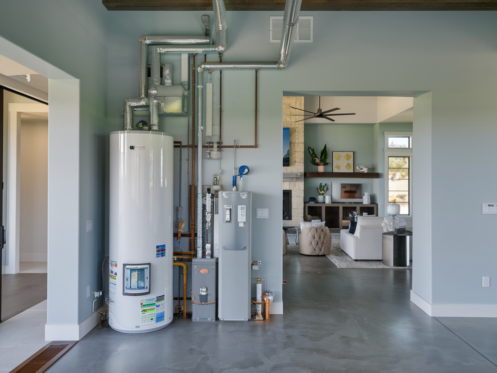Understanding the cost of replacing a water heater is important for homeowners. A water heater is a big investment, and knowing what factors affect the replacement cost can help you make smart choices. Several elements can affect the cost, including the type, size, and energy efficiency of the water heater. Additionally, the installation and brand also affect the final price.
In this article, we’ll explore the various factors that impact water heater replacement costs. We’ll look at the differences between tank and tankless systems, discuss installation complexities, and highlight energy-efficient options that can save you money in the long run. We’ll also provide insights into expected costs and offer tips on choosing the right time to replace your water heater.
Factors Affecting Water Heater Replacement Cost
Several factors can affect the cost of replacing a water heater. Here’s a closer look at some key things to think about:
- Size: The size of the water heater you need depends on your home’s hot water needs. Larger units typically cost more, but they can better meet the needs of bigger families.
- Type: There are two main types of water heaters: tank and tankless. Tankless models tend to have a higher initial cost but can save money on energy bills over time due to their efficiency.
- Brand: Different brands offer various features and warranties. Choosing a well-known brand can sometimes mean a higher upfront cost but can offer peace of mind and dependability.
- Installation Complexity: If your installation requires additional work, such as upgrading gas lines or electrical systems, this can increase the overall cost. Professional installation is recommended to ensure safety and efficiency. Labor costs can vary based on your location and the complexity of the installation.
- Energy Efficiency: Opting for an energy-efficient model can reduce long-term costs. The Department of Energy provides guidance on selecting energy-efficient water heaters, which can help lower your utility bills and may qualify for incentives.
Understanding these factors will help you better estimate the water heater replacement cost and make a choice that fits your budget and needs.
Hot Water Heater Replacement Cost: What to Expect
When it comes to replacing a hot water heater, understanding the costs involved can help you plan your budget well. The replacement cost usually includes several components:
- Materials: This includes the new water heater unit itself and any additional materials needed for installation.
The cost of replacing a hot water heater can be very different depending on the type of unit you choose. Here’s a general cost range you might see:
- Standard Tank Water Heaters: Typically, these can range from $500 to $1,500.
- Tankless Water Heaters: These are often more expensive, ranging from $1,000 to $3,500, but they offer energy savings over time.
Beyond the basic replacement costs, there are possible extra costs to consider:
- Permits: Some areas may require permits for water heater installation, which can add to the cost.
- Disposal Fees: Removing and disposing of the old unit might incur extra charges.
Water Heater Installation Cost: Breaking Down the Expenses
Understanding the breakdown of installation costs can help you make smart choices. Here’s what typically adds to the cost:
- Unit Cost: The price of the water heater itself, which varies based on type and brand.
- Additional Parts: Sometimes, additional parts like venting systems or new piping are necessary, which can increase costs.
Choosing a professional installer is essential for ensuring both safety and efficiency. A skilled installer can:
- Ensure the unit is correctly connected to your home’s plumbing and electrical systems.
- Identify any potential issues that could arise during installation and address them proactively.
When selecting an installer, consider their experience and reputation. An experienced professional can help you save money by reducing future repair needs and maximizing the efficiency of your new water heater.
Changing Water Heater: When is the Right Time?
Knowing when to replace your water heater can save you from surprise cold showers and expensive repairs. Here are some signs that it’s time for a new one:
- Age: Most water heaters last about 8 to 12 years. If yours is nearing this age, it might be time to consider a replacement.
- Rusty Water: If you notice rusty water coming from your taps, it might mean that your water heater is rusting from the inside.
- Noisy Operation: Loud noises from your heater, like rumbling or popping, might mean sediment build-up, which reduces efficiency.
- Leaks: Any water pooling around your heater is a sure sign that it’s time for a replacement.
Replacing your water heater at the right time can help you avoid higher costs and inconvenience later. For tips on maintaining your water heater to extend its life, check out this maintenance guide.
Saving on Water Heater Replacement with Incentives
Replacing a water heater can be a big investment, but there are ways to save. Many energy-efficient models come with incentives or rebates that can help reduce the overall cost. Here’s what you need to know:
- Rebates and Incentives: Many utility companies and government programs offer rebates for purchasing energy-efficient water heaters. These can significantly lower your initial investment.
- Energy Savings: Energy-efficient models not only qualify for rebates but also reduce your monthly utility bills, providing long-term savings.
- Environmental Impact: Choosing an energy-efficient water heater helps reduce your carbon footprint, contributing to a more sustainable environment.
For more information on available incentives, you can visit the Energy Trust of Oregon website. Taking advantage of these incentives can make upgrading to a new water heater more affordable and beneficial.
Summary and Expert Tips
Understanding the water heater replacement cost is essential for homeowners looking to maintain a comfortable and efficient home. Here’s a quick summary of the key points discussed:
- Factors Influencing Costs: The type, size, and energy efficiency of the water heater significantly impact the replacement cost.
- Cost Breakdown: Replacement costs include labor, materials, permits, and disposal fees.
- Timing for Replacement: Recognizing the signs of a failing water heater can prevent more costly repairs or damage.
- Incentives and Rebates: Take advantage of available rebates for energy-efficient models to reduce costs.
For expert tips, consider the following:
- Opt for energy-efficient models to save on utility bills.
- Regular maintenance, as outlined in the Forbes maintenance guide, can extend the life of your water heater.
- Consult with professionals to ensure the best choice and installation for your home.
By making informed decisions, you can optimize both performance and cost-efficiency for your water heater.
Ensure Comfort with Quality Cooling and Heating Services
When it comes to water heater installations, trusting professionals is crucial. Quality Cooling and Heating offers reliable HVAC services that ensure your home remains comfortable and safe. Serving the Greater Austin and Abilene areas, they are dedicated to providing top-notch service with a customer-centric approach. Whether you need a new installation or emergency services, their expertise guarantees satisfaction.
For more information on their services, visit Quality Cooling and Heating. Their commitment to excellence and community makes them a trusted choice for all your HVAC needs. Experience peace of mind with their professional and efficient service, ensuring your home’s comfort year-round.


